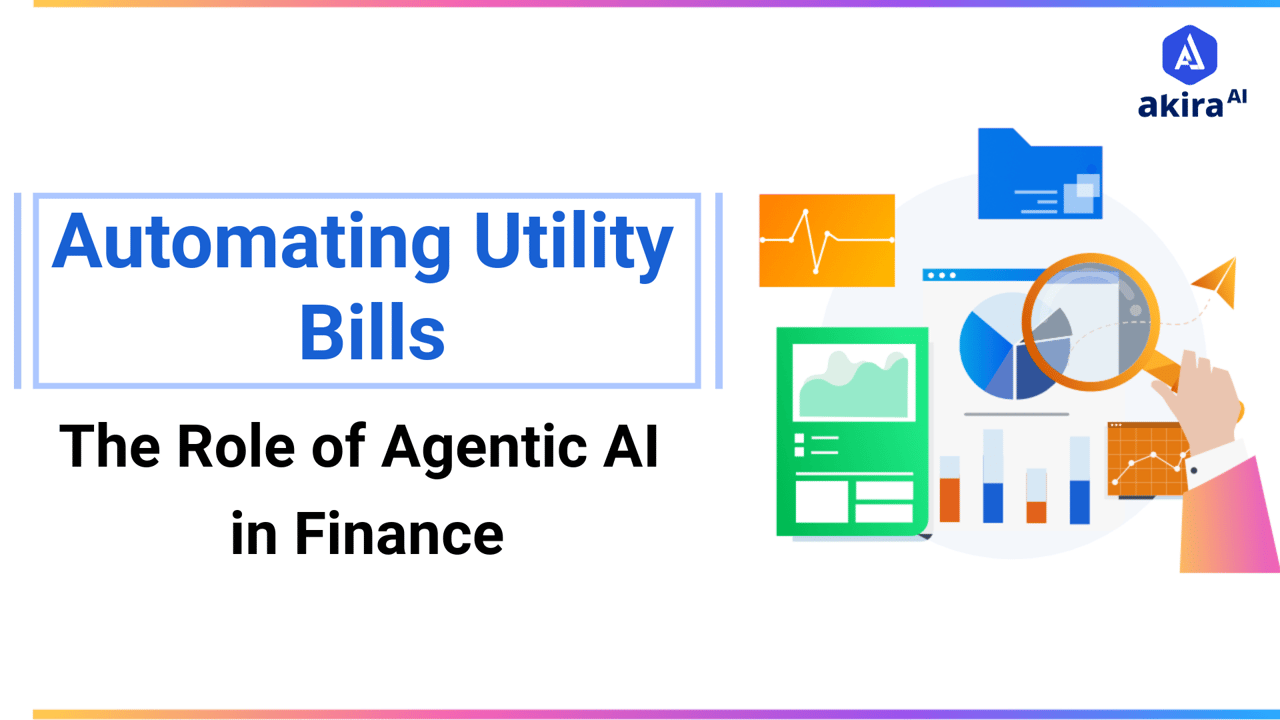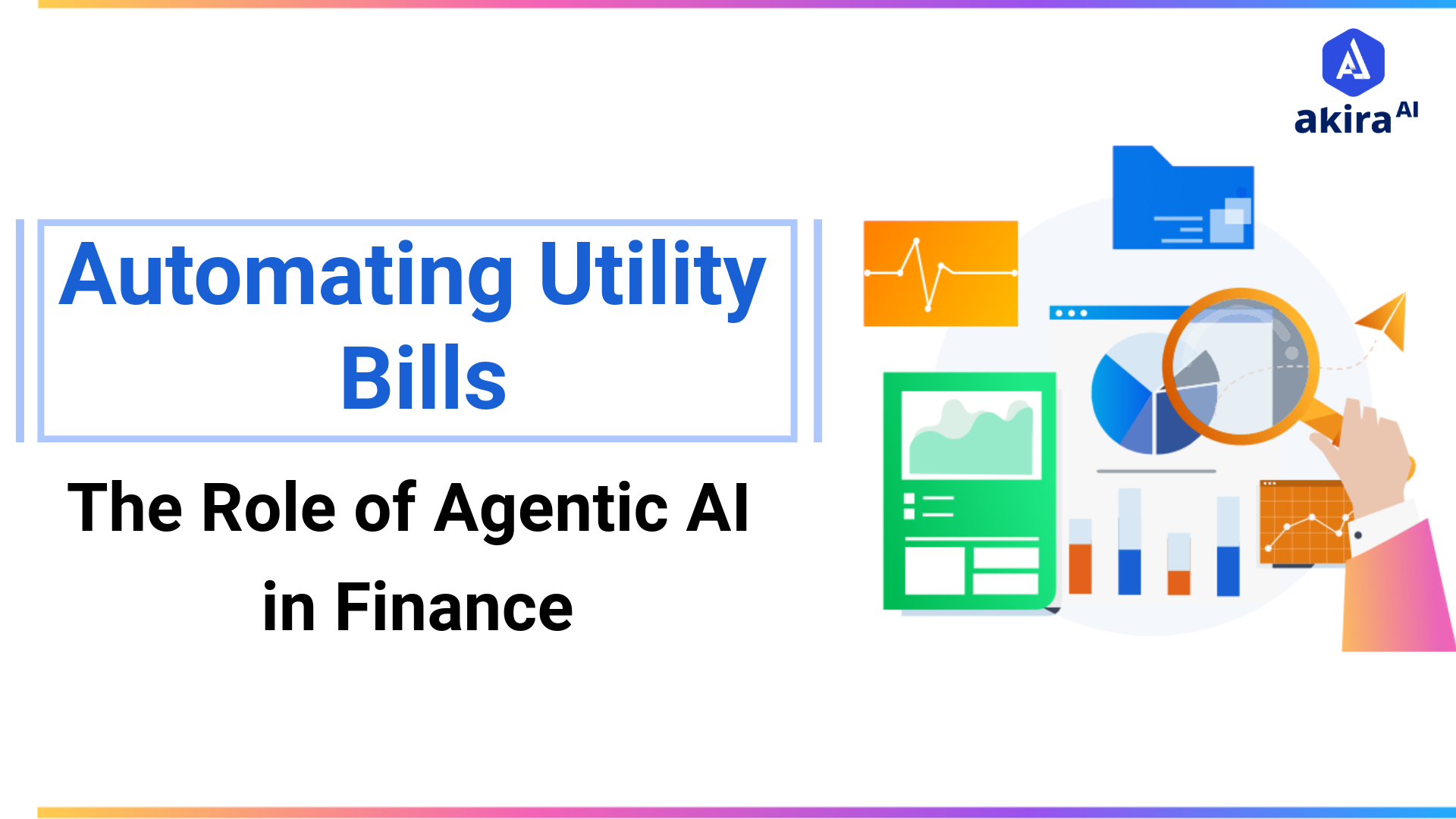Key Insights
Are you overwhelmed by the complexities of utility bill processing? You’re not alone—many organizations struggle with manual methods that are prone to errors and inefficiencies. Fortunately, Agentic AI is transforming this landscape, automating data entry, validation, and payment processing. This blog explores how AI agents streamline utility bill management, improve accuracy, and enhance operational efficiency, allowing finance teams to focus on strategic initiatives rather than tedious administrative tasks.

Are you tired of the constant struggle with utility bills? If so, you’re not alone! Utility bill processing can be overwhelming, particularly when relying on manual methods prone to errors and inefficiencies. Thankfully, Agentic AI offers a breath of fresh air. Just picture yourself with a system that enters data, checks charges, processes payments, and improves the degree of accuracy. In this blog, we’ll look closer at how AI agents are transforming how organizations manage their utility invoices. The benefits of AI-driven solutions are remarkable, from improving efficiency to reducing costs.
What is Utility Bill Processing in Finance?
Utility bill processing involves systematically handling invoices from service providers for electricity, water, and gas. This process involves extraction of data, verifying the data, approval, and last of all payment. It is an essential aspect of controlling expenditures and making timely payments as they greatly affect an organization’s financial performance.
Effective utility bill management not only ensures that payments are made on time but also helps organizations track their utility usage patterns. Such tracking can help improve measures on energy consumption and cost saving amongst the organizations.
A Brief Overview of Utility Bill Processing in Finance
The conventional utility bill processing technique normally involves the use of manual entry, which is time-consuming, inaccurate, slow, and expensive. Employees may have to waste a considerable amount of time in charge of checking, data input, and payment reconciliation. Moreover, these labor-intensive processes are filled with errors that can cause significant financial loss.
AI agents, on the other hand, are revolutionizing this ground by automating tasks, increasing efficiency, and improving the accuracy and speed of outputs. These agents analyze vast amounts of data, ensuring utility bills are processed swiftly and correctly. They utilize sophisticated algorithms to identify anomalies, verify accuracy, and provide actionable insights. This shift improves operational efficiency and allows finance teams to focus on strategic initiatives rather than getting bogged down by administrative tasks. Akira AI exemplifies this transition by implementing AI-driven solutions that significantly reduce processing times and errors.
Traditional vs. Agentic AI-based Utility Bill Processing in Finance
|
Aspect |
Traditional Processing |
Agentic AI-based Processing |
|
Data Entry |
Manual data entry prone to errors |
Automated data extraction and entry |
|
Processing Speed |
Slower, with significant delays |
Rapid processing with real-time analysis |
|
Error Rate |
High error rates due to manual handling |
Minimal errors with AI validation |
|
Cost Efficiency |
Higher operational costs |
Reduced costs through automation |
|
Scalability |
Difficult to scale |
Easily scalable with AI algorithms |
|
Reporting |
Time-consuming report generation |
Instant analytics and insights |
Akira AI Multi-agent in Action
 Fig1: Architecture Diagram of Autonomous Utility Bill Processing
Fig1: Architecture Diagram of Autonomous Utility Bill Processing
To improve efficiency in utility bill processing, Akira AI uses a multi-agent system. In this approach, the processing cycle has different agents who are set to address distinct processes with precision. The agents used by Akira AI include:
-
Master Orchestrator Agent - The process begins with the Master Orchestrator Agent, which is triggered by incoming utility bills from online portals or emails containing invoices. This agent acts as the central controller of the entire workflow, coordinating the activation of subsequent agents based on the data received. By overseeing the entire process, it ensures that each task is executed in the correct order and that the workflow remains efficient and seamless from start to finish.
-
Data Collection Agent: Once triggered, the Data Collection Agent pulls utility bill data from various sources, including utility provider portals and email attachments. It automatically extracts key details such as billing amounts, account numbers, due dates, and any other relevant information. This agent streamlines the data collection process, reducing the need for manual data entry and ensuring that all necessary details are gathered accurately for further processing.
-
Data Entry and Calculation Agent: After the data has been collected, the Data Entry and Calculation Agent takes over. It logs the extracted information into the system, ensuring that each bill is accurately recorded. The agent also performs automatic calculations, such as totals, taxes, and any applicable discounts or adjustments, ensuring that the amounts are correct and up to date. This step eliminates human errors in data entry and ensures that all billing information is processed quickly and accurately.
-
Reconciliation and Comparison Agent: The Reconciliation and Comparison Agent then steps in to verify the data. It compares the current utility bill with historical billing data to flag any discrepancies or inconsistencies, such as unexpected charges or discrepancies between current and past bills. By identifying these issues early, the agent helps prevent overpayments and ensures that all charges align with previous records, facilitating faster resolution of any billing errors.
-
Payment Processing Agent: Finally, the Payment Processing Agent confirms the payment, schedules it for processing, and records the transaction. Once payment is authorized, this agent ensures that funds are transferred on time and that all necessary documentation is updated in the system. It ensures that no payment deadlines are missed and that all payment records are accurately logged, minimizing the risk of late fees or payment errors.
Use Cases and Application of Utility Bill Processing in Finance
Utility bill processing has several uses in different business fields. Here are some notable use cases:
-
Retail Chains: Large retailers often operate in multiple locations, each generating its utility bills. AI agents can automate the processing of these invoices in order to control expenses, pay the bills on time, and find out how they can save energy. This way, retailers were able to achieve better rates and increase the effectiveness of the measures carried out in all the outlets.
-
Manufacturing: There are always large utility costs associated with factories, which is why accurate billing of these costs is important in managing factory expenses. Agentic AI systems provide manufacturers with the opportunity to control energy usage and study patterns to get better offers from utility providers.
-
Healthcare Facilities: Hospitals and clinics face unique challenges in managing utility costs due to high energy needs. Automated processing of utility bills through intelligent automation helps institutions maintain compliance with regulatory standards and lower financial risks. Healthcare organizations have an opportunity to use their energy efficiency through artificial intelligence solutions to make healthcare systems sustainable.
-
Educational Institutions: Schools and universities benefit from automated utility bill management. With this technology, they are able to lodge budgets properly to ensure that the funds are well directed where they are needed most, rather than in overhead.
-
Hospitality Sector: Hotels and resorts manage extensive utility services, making effective utility bill processing essential for controlling costs. AI-driven processing helps them track consumption and other expenses. This brings sustainability and optimizes guest satisfaction due to practical energy supply and consumption.
-
Government Agencies: Municipalities and government bodies manage multiple properties, each with its utility expenses. These agencies help improve accountability to public expenditure through the automation of utility bills. Causal AI solutions can detect such issues relating to billing and help in the proper utilization of energy which will cut costs.
-
Commercial Real Estate: Property management firms overseeing commercial buildings can streamline operations by utilizing automated utility bill processing. By analyzing utility costs across various properties, they can identify trends and areas for improvement. This strategic management reduces operational costs while enhancing tenant satisfaction through improved building efficiency.
Operational Benefits of Utility Bill Processing in Finance
-
Productivity Revolution: AI agents are expected to handle 80% of processing work by 2025, enhancing operational efficiency. This makes it possible for the finance teams to redirect their attention to strategic planning.
-
Efficiency Elevation: AI solutions can boost productivity by 30% and operational efficiency by 25%. Since repetitive tasks are handled by the system, there’s increased time for staff to engage in financial analysis and projection.
-
Precision in Accuracy: Agentic AI validation processes significantly reduce errors in data entry. This accuracy saves costs and strengthens relationships with utility providers through timely payments.
-
Insightful Analytics: AI systems enable users to monitor their utility usage in real time and make relevant decisions on energy consumption and costs, efficiency, and expense.
-
Streamlined Compliance: The multi-agent system simplifies utility bill processing, ensuring compliance with regulations. Automated tracking minimizes compliance risks, allowing finance teams to focus on strategic initiatives.
Technologies Transforming Utility Bill Processing
Several technologies are instrumental in enhancing utility bill processing with AI agents:
-
Optical Character Recognition (OCR): This technology scans and enters paper bill data into the system, directing the data into the right format for analysis.
-
Machine Learning (ML): ML algorithms enhance validation processes by learning from historical data, identifying patterns, and predicting future usage and billing.
-
Natural Language Processing (NLP): NLP improves the understanding of invoice context, enabling AI systems to handle various document types and formats.
-
Blockchain: Introducing blockchain technology helps the organization create safer and more transparent records of the transactions, which minimizes the chances of all fraudulent activities in paying the accounts.
-
Cloud Computing: Cloud solutions facilitate data accessibility and storage, allowing organizations to manage their utility data from anywhere while ensuring robust security measures.
-
Real-time Data Analytics: This capability allows finance teams to monitor utility usage continuously, providing insights that can lead to proactive decision-making and cost management.
The Future of AI Agents for Utility Bill Processing
The landscape of utility bill processing is set to evolve significantly. Key trends to watch include:
-
Greater Adoption of Autonomous Agentic AI Systems: More companies will adopt end-to-end self-sufficient AI systems for utility statement processes. Such systems will run with minimal supervision from human beings and, therefore, increase efficiency and accuracy.
-
Enhanced Security with AI Guardrails: As the telecommunication industry becomes more virtual, security frameworks will be enhanced with AI guardrails to secure personal information. This comprises proper methods of data encryption and how they meet the guidelines of data protection laws.
-
Integration of Composite AI: Utilizing various AI methodologies to achieve superior decision-making capabilities. This integration will allow organizations to leverage the strengths of different AI technologies, leading to more comprehensive solutions for utility management.
-
Real-time Analytics: Organizations will gain real-time information to enable timely management decisions regarding utilities. With this, it will become possible for the companies to predict future costs enabling them to control their consumption tendency.
-
Sustainability Initiatives: As businesses increasingly focus on sustainability, AI agents will help monitor and reduce energy consumption. Businesses will use big data to adopt environmentally friendly practices that will cut down their carbon footprint.
-
Interoperability Across Systems: Subsequent AI solutions will focus on the integration of software into the current organizational systems. This will help organizations to solve problems like duplication in data management, bringing efficiency in the handling of data.
Conclusion: AI Agents for Utility Bill Processing
In light of the opportunities presented by agentic AI in utility bill processing, now is the time for organizations to act. By embracing these intelligent solutions, finance teams can significantly improve their operational efficiency and accuracy. The shift toward automation is not just a trend; it’s a critical step in adapting to the demands of the modern business environment. Imagine a world where utility management is streamlined, errors are minimized, and teams can focus on strategic initiatives instead of administrative tasks.


